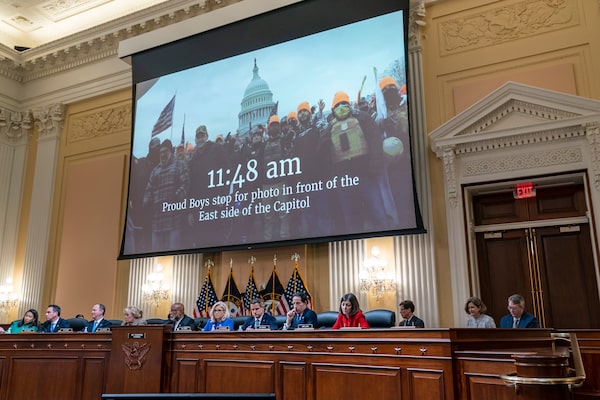
The House select committee investigating the Jan. 6 attack on the U.S. Capitol hold a hearing at the Capitol in Washington on June 9.J. Scott Applewhite/The Associated Press
They were 187 minutes that changed the American political world.
Now, some 560 days later, the United States is still grappling with, assessing, investigating – perhaps even initiating unprecedented legal action in response to – the storming of Capitol Hill and president Donald Trump’s role in instigating it.
In a prime-time session Thursday night, the House committee examining the Jan. 6, 2021, insurrection will probe those 187 minutes – the time between the end of Mr. Trump’s “Stop the Steal” speech at the Ellipse outside the White House and his reluctant “you’re very special” video urging the rioters to go home. And in that time in which a president and the mob he mobilized tried to overturn an election – remarkably, in just a bit more than three hours on a winter morning – one of the most vital, animating assumptions of 2⅓ centuries of American history was almost overturned as well.
Thursday’s hearing, perhaps the committee’s last, intends to examine what happened inside the White House as rampaging Trump supporters inside the Capitol sought to halt the counting of electoral votes affirming the election of Joe Biden, thus undermining the peaceful transfer of power.
“We’ll talk about what was going on in the White House while the Capitol was being overrun, and basically we will show what the president – as best we can put together – was doing all that time,” said Representative Bennie Thompson, the Mississippi Democrat chairing the committee. “Or not doing.”
But perhaps more significant is what was almost undone: the orderly and ordinary way one party has, without incident or imprecation, turned over the presidency to another – a custom that began in 1801 and was, until last year, regarded as one of the cherished emblems of U.S. democracy.
At the same time, the rioters who ransacked the Capitol, and the president who inspired their attack, have kept alive the lie that the election was tainted, thus legitimizing extreme action to overturn the results – an effort that, the committee members have charged in seven previous sessions, amounts to a seditious plot to overthrow the U.S. government.
But those 187 minutes and the presidential rhetoric that preceded them have had a secondary effect that is influencing the selection of candidates for this fall’s midterm congressional elections and could potentially reshape the 2024 presidential election.
Mr. Trump’s assertions about electoral fraud and the breaching of the Capitol walls by the rioters have essentially frozen the Republican Party in place, with rank-and-file members believing the election was compromised, elected officials endorsing that claim publicly – even if many of them doubt it privately – conspiracy theorists emerging in GOP primary contests and the party focused as much on the stolen election past as on the policy future.
That will be the case as long as Mr. Trump remains the dominant figure in the party.
If he runs again in 2024, the questions about the 2020 election will take centre stage. If he does not or if, for example, Governor Ron DeSantis of Florida beats him to become the party nominee, the controversy over the 2020 election will become a swiftly receding memory.
A century and a half ago, the defeated South was mired in a similar cryogenic myth known as the Lost Cause – a conviction that the Confederate cause in the Civil War was honourable and heroic, that the evils of the issue at its centre (slavery) were overstated if not invented and that its principal ideology (states’ rights) was rooted in U.S. tradition.
“What we have after 2020,” said Dennis Goldford, a political scientist at Drake University in Des Moines, Iowa, “is a new version of the late 19th-century Lost Cause, added to a view that the Democratic Party is essentially illegitimate and un-American.”
Indeed, the Trump Lost Cause has many of the same elements: that the rebellion against political norms in working to restrict immigration, punish trading partners and undermine international alliances and institutions that the 45th president fomented during his administration was consistent with the country’s principal ideological outlook; that seeking to overturn the election results was just and honourable; and that, in contemporary times as in the post-Civil War era, a largely East Coast cabal of the educated and the elite is conspiring to write a false historical narrative.
Just days ago, seven distinguished Republicans – including former senators Gordon Smith of Oregon and John Danforth of Missouri, former solicitor-general Theodore Olson and widely respected GOP election litigator Benjamin Ginsberg – produced a 72-page examination of all the claims of election illegitimacy that was lost in the din of the debates over abortion and inflation. They found no fraud and asserted that the repetition of the stolen-election mantra was harming the country and “discredits” the Republican Party.
“We urge our fellow conservatives to cease obsessing over the results of the 2020 election, and to focus instead on presenting candidates and ideas that offer a positive vision for overcoming our current difficulties and bringing greater peace, prosperity, and liberty to our nation,” they said.
The obsession with the 2020 election has deflected attention both inside the party and among the public away from issues that have been part of the Republican playbook since the Ronald Reagan years: opposition to abortion, support for lower taxes, a commitment to less regulation, deep skepticism if not contempt for the “administrative state,” sometimes described within the Trump circle as the “deep state.”
“The main part of the party has been pretty committed to certain things and they still are,” said John Ferejohn, a New York University legal scholar and political scientist. “Trump delivered on all of these as president. Any candidate the Republicans select will advocate the same positions.”
But as long as Mr. Trump is the putative party leader, those issues will be accompanied by the stolen-election theme.
Thursday’s hearing is designed to show how that theme went awry. But history may show that the man who promulgated it altered the Republican Party. By the time those 187 minutes had ended, a fundamental transformation of the GOP – from the bulwark of the American establishment and a redoubt of the rich into an insurgency of extremists and a coalition of the dispossessed – was complete.
Our Morning Update and Evening Update newsletters are written by Globe editors, giving you a concise summary of the day’s most important headlines. Sign up today.
 David Shribman
David Shribman